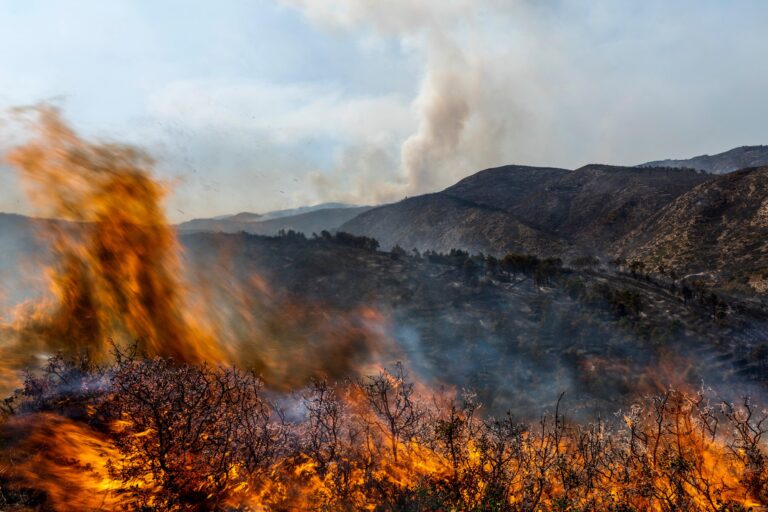Massive wildfires have erupted across multiple regions in Spain, prompting widespread evacuations and emergency responses. The blazes, fueled by soaring temperatures and dry conditions, have engulfed vast areas of forestland, threatening communities and wildlife alike. This developing crisis has prompted urgent action from local authorities and firefighting teams as they race to contain the flames. Al Jazeera provides an in-depth video report capturing the scale and impact of these devastating fires.
Wildfires Rage Across Spain Driven by Extreme Heat and Drought
Vast areas of forest and farmland in Spain have been engulfed by fierce flames as soaring temperatures and prolonged drought conditions exacerbate the wildfire crisis. Emergency services are battling multiple blazes that have forced thousands to evacuate their homes, as wind gusts fan the rapidly spreading fires. Satellite imagery reveals smoke plumes stretching for miles, while local authorities warn that the situation could worsen without significant rainfall in the coming days.
Key challenges faced by firefighting units include:
- Intense heat waves driving fire intensity to unprecedented levels
- Restricted water resources due to drought, limiting firefighting capacity
- Rough terrain impeding rapid movement of ground crews
The government has deployed additional air tankers and military personnel to assist in containment efforts, prioritizing the protection of critical infrastructure and residential zones. Below is an overview of some of the most affected regions:
| Region | Acres Burned | Evacuations | Status |
|---|---|---|---|
| Andalusia | 15,300 | 4,200+ | Active |
| Castilla-La Mancha | 10,500 | 2,800+ | Partially Contained |
| Valencia | 7,200 | 1,500+ | Active |
Emergency Services Mobilize Rapid Response to Contain Blazes
Firefighters, emergency medical teams, and local authorities swiftly converged on multiple fronts as the wildfire rapidly expanded across affected regions. Utilizing advanced aerial units, including helicopters and water-dropping planes, responders aimed to curb the flames before they could engulf nearby communities. Evacuation orders were promptly issued for vulnerable neighborhoods, with emergency shelters established to accommodate displaced residents. Coordination between national and regional agencies proved critical in optimizing resource allocation under increasingly volatile conditions.
- Over 500 personnel deployed across high-risk zones
- Dozens of emergency vehicles mobilized to assist ground operations
- Real-time monitoring set up through drone surveillance
- Continuous weather updates guiding tactical decisions
| Response Unit | Number Deployed | Primary Role |
|---|---|---|
| Firefighters | 350 | Direct fire containment |
| Aerial Support | 12 helicopters & planes | Water & retardant drops |
| Medical Teams | 45 | Emergency aid & evacuation |
| Security Forces | 60 | Evacuation & perimeter control |
The response teams face mounting challenges as shifting winds threaten to spread the wildfires to forested reserves and residential areas alike. Authorities have issued travel restrictions and warned against unauthorized access to containment zones to ensure safety and facilitate continuous firefighting efforts. Community alert systems and emergency broadcasts remain active to keep the public informed of developments, emphasizing vigilance amid rapidly changing circumstances.
Experts Urge Strengthened Climate Policies and Community Preparedness
In light of the recent devastating wildfires sweeping through Spain, climate specialists have highlighted the urgent need for more robust environmental regulations. Authorities must prioritize reducing greenhouse gas emissions and implement stricter land management protocols to mitigate the risk of such disasters. Experts emphasize that current policies often fall short in addressing both the causes and the accelerating frequency of wildfires, which are exacerbated by rising global temperatures and prolonged drought conditions.
Community-level readiness is equally crucial. Specialists recommend enhancing local response capabilities through:
- Improved early warning systems to alert residents promptly of impending fire threats.
- Public education campaigns focused on fire safety and evacuation procedures.
- Investment in fire-resistant infrastructure within vulnerable regions.
- Strengthening cooperation among emergency services for faster, coordinated responses.
| Policy Area | Key Recommendation |
|---|---|
| Emission Reduction | Accelerate transition to renewables |
| Land Management | Controlled burns and vegetation control |
| Emergency Response | Cross-agency coordination protocols |
| Community Engagement | Fire safety training and drills |
` tags added:
“`html
In light of the recent devastating wildfires sweeping through Spain, climate specialists have highlighted the urgent need for more robust environmental regulations. Authorities must prioritize reducing greenhouse gas emissions and implement stricter land management protocols to mitigate the risk of such disasters. Experts emphasize that current policies often fall short in addressing both the causes and the accelerating frequency of wildfires, which are exacerbated by rising global temperatures and prolonged drought conditions.
Community-level readiness is equally crucial. Specialists recommend enhancing local response capabilities through:
- Improved early warning systems to alert residents promptly of impending fire threats.
- Public education campaigns focused on fire safety and evacuation procedures.
- Investment in fire-resistant infrastructure within vulnerable regions.
- Strengthening cooperation among emergency services for faster, coordinated responses.
| Policy Area | Key Recommendation |
|---|---|
| Emission Reduction | Accelerate transition to renewables |
| Land Management | Controlled burns and vegetation control |
| Emergency Response | Cross-agency coordination protocols |
Community Engagement
The ConclusionAs wildfires continue to ravage large areas of Spain, emergency services remain on high alert, battling flames amid challenging weather conditions. The situation underscores the growing risks posed by climate change and the urgent need for coordinated responses to protect lives, property, and natural landscapes. Al Jazeera will continue to monitor developments and provide updates as more information becomes available. |




